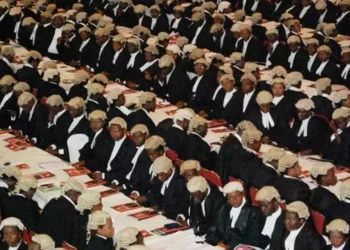The Federal Inland Revenue Service (FIRS) on Monday began the trial of Binance, a cryptocurrency exchange platform, in the alleged tax evasion case filed by the tax agency.
The FIRS presented its first witness, Mbami Shomgwan, Manager of the TaxPromax Technology Department at FIRS, before Justice Emeka Nwite of the Federal High Court in Abuja.
Nairametrics previously reported that on May 17, 2024, the FIRS amended its lawsuit, stating that Binance allegedly failed to collect and remit various categories of taxes to the federation, particularly the Value Added Tax (VAT) and Company Income Tax (CIT), as stipulated by Section 40 of the FIRS Establishment Act 2007, as amended.
In the charge, Binance was accused of offering services—including the buying and selling of cryptocurrencies, as well as the remittance and transfer of those assets—to Nigerians while failing to deduct the necessary VAT arising from its operations.
Amid the case, the court, on June 14, 2024, discharged Tigran Gambaryan, a 39-year-old American, and the fleeing Nadeem Anjarwalla from the FIRS tax evasion case against Binance.
This followed a notice from Binance about its appointment of a Nigerian representative, Ayodele Omotilewa.
The Binance representative in court had denied the tax evasion allegations, paving the way for trial.
Court Proceedings
At the resumed proceedings on Monday, the witness led in evidence by FIRS lawyer Moses Idehu, told the court that the FIRS automated tax system, known as TaxPromax, is an electronic application that handles the core functions of the FIRS, including taxpayer registration, tax collection, and accounting.
“It is expected that such a taxpayer must be registered on the automated tax system.
“Once registration is done, the taxpayer is added to the pool of registered taxpayers in Nigeria.
“It is only then that the taxpayer may be able to meet their tax obligations in Nigeria,” he added.
- The witness emphasized that the TaxPromax system keeps records of every transaction carried out by taxpayers, appearing to corroborate the FIRS’s claims of alleged tax evasion by Binance.
- He further stated that the application was deployed on June 7, 2021, at the peak of the COVID-19 pandemic and has been in operation since.
- He added that taxpayers can log into the application from anywhere in the world, enabling them to fulfill their Nigerian tax obligations.
“If one is not registered on the platform, such a person or institution will not be able to meet their tax obligations, which include filing tax returns, tax assessment, and payment of taxes,” he said.
Under cross-examination by Binance’s lawyer, Chukwuka Ikwuazom (SAN), the witness maintained that every potential taxpayer who has “significant economic presence” in Nigeria, either directly or indirectly, is expected to register for tax purposes in the country.
“If you are not liable to pay tax in Nigeria, do you have an obligation to register?” the senior lawyer asked.
“No. However, there are two types of taxpayers in Nigeria: Nigerian companies and non-Nigerian companies. All Nigerian companies are expected to register whether they are liable or not. However, non-Nigerian companies must register as long as they have significant economic presence in Nigeria.”
The witness further clarified that a non-Nigerian company that does not have a significant economic presence in Nigeria is not required to file tax returns, subscribe for tax assessment, or make tax payments.
After his testimony, the court adjourned the trial to April 11, 2025.
Backstory
The Federal Government had accused Binance of influencing foreign exchange (FX) rates, resulting in stricter legal oversight of crypto trading platforms.
- The Minister of Information, Idris Mohammed, stated that Binance had a turnover of over $20 billion in Nigeria in 2023 alone.
- On February 28, 2024, Nigerian authorities detained the two senior Binance executives.
- As a result, the Economic and Financial Crimes Commission (EFCC) and FIRS separately sued Binance over alleged tax evasion, money laundering, and foreign exchange violations.
- The executives were held for several months, but Nadeem escaped from custody.
Gambaryan was eventually discharged by the EFCC due to his health condition and diplomatic intervention.
























